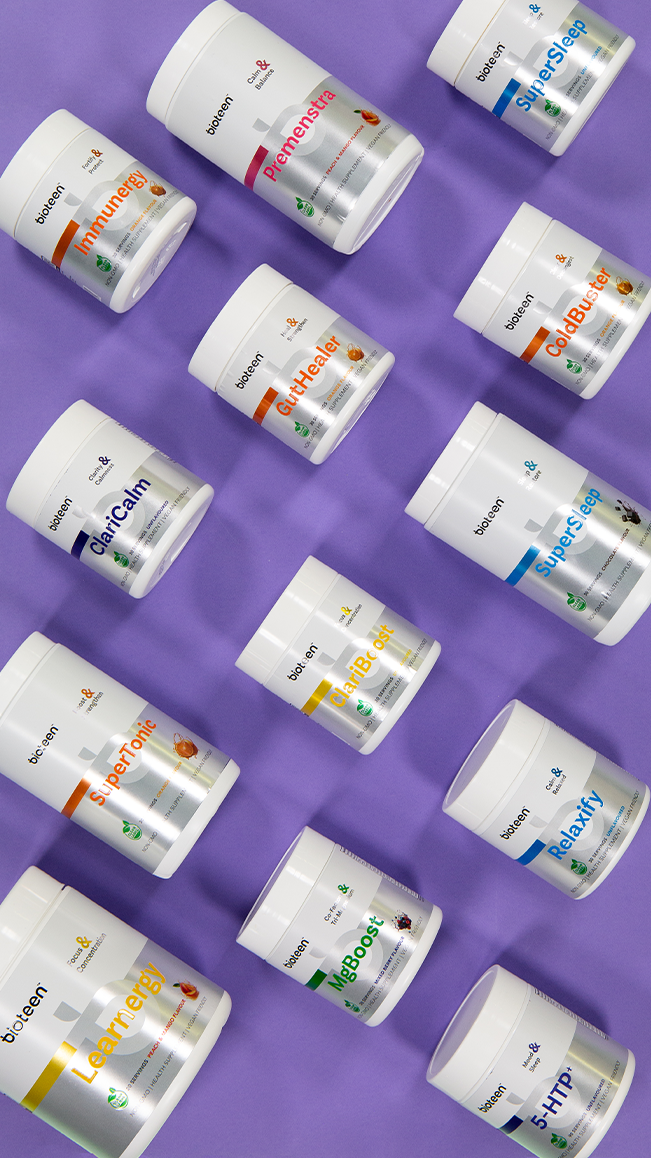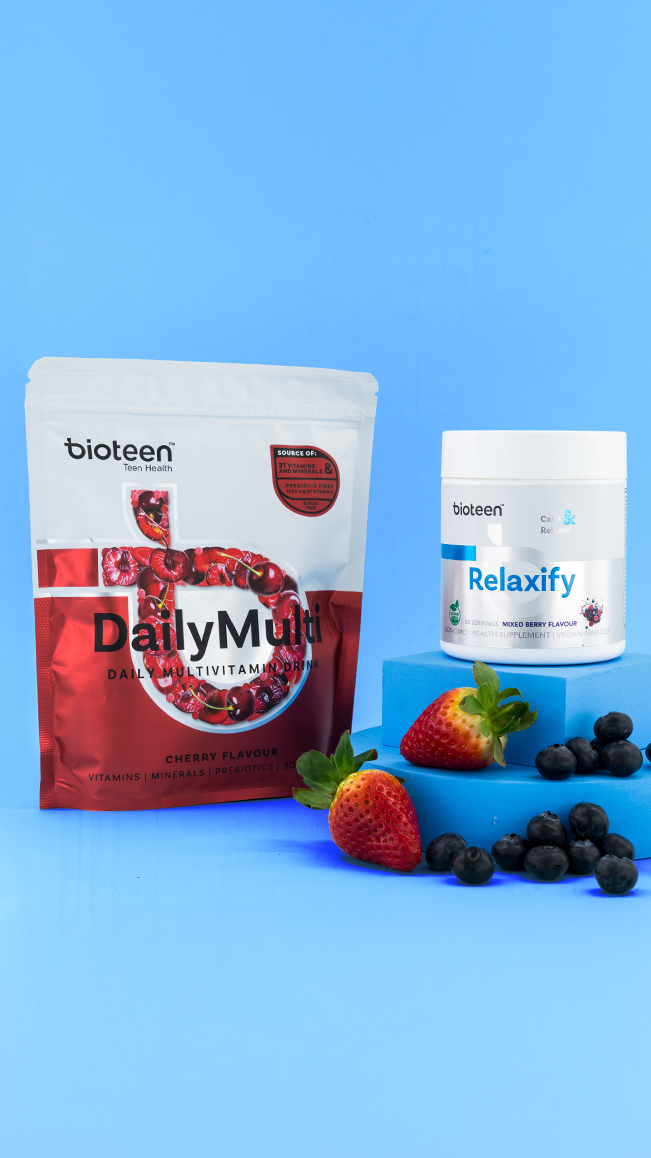
The importance of Immune Health
At Bioteen, we get it. Being a teen is tough work, both physically and emotionally. Which is why we are constantly working on creating high quality nutritional supplementation to help your teen get to where they need to be.
Shop all products here
We don’t stop there because we believe that supplementation alone is not enough. We also work really hard to bring you the most up to date, evidence based research on teen nutrition. Part of our mission is to support your teen’s immune system so that they have less down time and more time for the things that are important.
Read more about Bioteen’s origin story here!
We’re giving the immune system centre stage!
Many of us only think about our immune systems when we are already sick. Most of the time, this is too little, too late and overdosing on the traditional immune nutrient (vitamin C) (1) probably won’t help you get better any quicker. Life is unpredictable (the last few years have certainly shown us that) which means that we should take supporting our immune systems seriously every single day, not just when we think we may be at risk.
What exactly is the immune system?
Your immune system is made up of two separate but cooperative branches, the innate and the adaptive systems. They work together to protect you against the ever-present threat of invasion by pathogenic microorganisms like viruses, bacteria, parasites, and fungi. (2)
The innate immune system is their first line of defense and it’s there from the day that you’re born. It’s made up of a set of barriers that are designed to keep invading pathogens out and cellular components which effectively ‘eat’ pathogens that manage to get through. If the innate immune system doesn’t manage to contain the threat, it will activate the adaptive immune system. This system is made up of more specialized cells that have the ability to remember infections through the formation of antibodies. Once it has done this, if that specific infection happens again, it can step in and eliminate the threat more quickly. The more quickly your body can eliminate the threat, the less damage it can do to your body and the fewer symptoms you’ll experience.
We’ve got to support both these systems and their related pathways (like the gut, where 70-80% of the immune cells live) (3) if we really want to make a difference.
Learn more about Immunergy, our flagship immune support drink mix here
What happens when your teen gets sick?
Teens are constantly on the go and short-term stressors, like exams (4) or sports matches, can quickly lower their defenses putting them at risk of getting sick at these inopportune times.

Image 2
Besides the fact that when they’re sick, they risk infecting others, being sick usually comes with unpleasant side effects. These usually happen as a consequence of inflammation which is the byproduct of the war that is taking place between the body and the harmful pathogen.
When feeling sick, it’s common to have physical symptoms like pain and fever as well as psychological and neurobehavioural symptoms like social withdrawal, depression, irritability, impaired attention, fatigue, and sleepiness. Basically, the body is deliberately trying to slow you down, and keep you in bed and away from others (5) so that it can focus on making you better. What do these symptoms mean for a teenager?
Reduced ability to concentrate at school
Feeling tired and not being able to concentrate is not conducive to high performance at school. The more time that you’re sick, the more time you may need off from school, which may have an impact on your academic results (and academic-related anxiety) in the long run.
Read our 10-point plan to help teens control their stress.
Missed sports sessions
Feeling tired and miserable is not the way great sports sessions start. Besides not feeling like taking part in the session, when your teen is sick they definitely want to steer clear of their teammates to prevent spreading the infection to others. Less training can be a big problem for teens who take part in competitive sports. Prolonged downtime means less time for training which may have an effect on your competitive edge.
Proper recovery using the right nutritional ingredients is also integral to supporting a healthy immune system. Read our article 4 reasons nutrition after training is important here!
Poor sleep
Being sick can mess with your teens' sleep (6). At night time symptoms often get worse as the immune system is shifted into high gear and there is more energy available to fight the good fight. Less sleep means less energy for the next day.
Did you know teens have a different circadian rhythm than adults? Read this article about maintaining a healthy biological clock as a teen.
The bottom line
While your teen’s body tries its best to recover, they’re left feeling tired, irritable, and frustrated because they are unable to do the things that need to get done. While we’re never going to completely stop them from getting sick, we can help to support their immune system every day so that if they do get sick, it’s less frequent and less severe.
Being sick usually means losing valuable time and in the long run, this can affect their goals when it comes to school, sports, and social activities. This lost time doesn’t only have an effect on your teen’s performance but can also increase their levels of stress and they worry about not being able to meet their goals. In a twist of fate, this stress lowers their immunity and increases their risk of getting sick, it’s like a vicious cycle!
Being a teen is a physically and psychologically challenging time as it is, without this kind of added pressure. That’s why it is so important to help teen’s prevent illness and also to prime and prepare their bodies to react appropriately if they get sick and do everything we can to help them recover with minimal damage and related side effects. This means not just focusing on one preventative pathway, but rather using a multipronged approach to not only promote general; wellness, but also to support all facets of the immune system on a daily basis. It’s not enough to remember the immune system only when we’re sick, it needs our attention every single day.
Find out more about our unique immune support supplements range here
- https://www.ncbi.nlm.nih.gov/pubmed/23440782
- https://www.ncbi.nlm.nih.gov/pmc/articles/PMC6212925/
- https://pubmed.ncbi.nlm.nih.gov/33803407/
- https://www.ncbi.nlm.nih.gov/pmc/articles/PMC1361287/
- https://academic.oup.com/emph/article/9/1/221/6296608
- https://www.sciencedirect.com/science/article/pii/S0091674995702121











